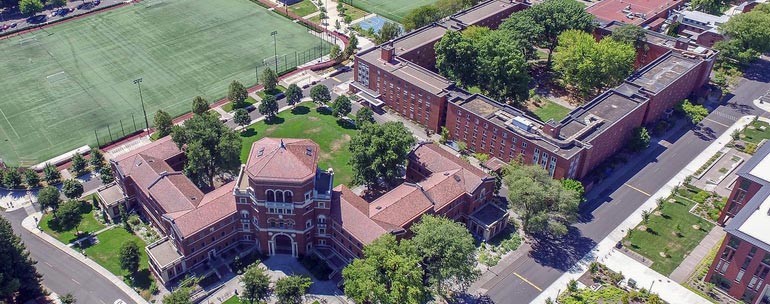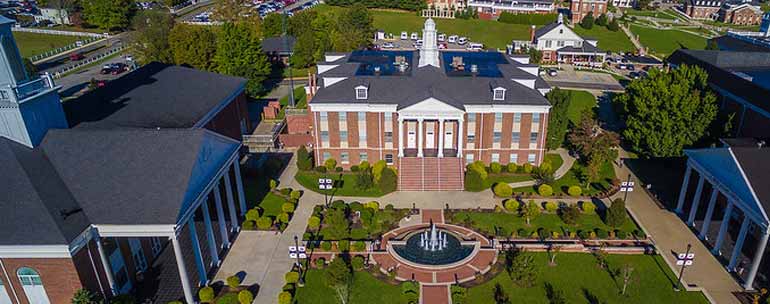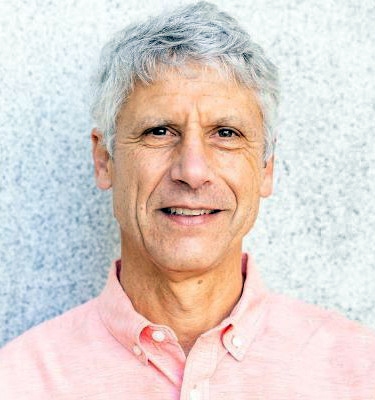If you have a background in psychology, biology, or medicine and want to be well positioned to help combat addiction problems plaguing society, you might consider earning a PhD in Addiction Psychology online.

Editorial Listing ShortCode:
This kind of advanced training can help equip you for a career providing direct clinical services or studying and researching addictive behaviors, diagnoses, and treatments.
Online PhD in Addiction Psychology Programs

In addition to providing advanced psychotherapy training, doctoral programs in addiction psychology can be a game changer for those who want to enter the fast-growing medical services management field. Many PhD holders also pursue research work or teaching roles related to behavioral counseling and addiction.
Editorial Listing ShortCode:
Professionals and scholars who decide to invest in this kind of academic program can study alongside top experts and researchers and enjoy exceptional learning experiences. In a addiction psychology doctoral program, students can:
- Acquire sophisticated insights into addiction and its causes
- Explore innovative addiction and substance abuse intervention models
- Pursue highly specialized career training
- Learn research methodology and design
Addiction psychology programs offer many perspectives on addiction informed by various branches of psychology. They can also include courses that examine addiction and substance abuse through the lenses of biology, physiology, and genetics.
Addiction Psychology Careers & Salaries

Most professionals who earn a PhD in Addiction Psychology become specialists in scientific research, public policy, or academia. Providing direct clinical services, in private practice or for a medical provider, is another career path for people who want to earn a doctorate in the field of addiction psychology.
According to the Bureau of Labor Statistics, career fields for professionals with interests in psychology, research, health, and science offer many service-oriented pathways.
| Careers | Annual Median Salaries |
| Chief Executives | $179,520 |
| Medical and Health Services Managers | $101,340 |
| General and Operations Managers | $97,970 |
| Postsecondary Education Administrators | $96,910 |
| Psychologists | $81,040 |
| Psychology Teachers, Postsecondary | $77,860 |
| Social and Community Service Managers | $74,000 |
| Writers and Authors | $69,510 |
| Survey Researchers | $59,740 |
| Substance Abuse, Behavioral Disorder, and Mental Health Counselors | $48,520 |
Some doctoral candidates also target a number of closely related careers, such as school psychologist, marriage and family therapist, or medical and health services manager. Clinical psychologists are required to be licensed, while addiction psychology professionals who are focused on research and management typically do not hold a license.
Addiction Psychology Doctorate Curriculum & Courses

Many doctoral programs include lecture courses, symposia, research methodology training, and supervised practicums or internships. Courses will typically cover various aspects of addiction science and relevant treatment principles and methods. Here are some course examples:
- Methods in Behavioral Psychology: This course is an overview of concepts, theories, and methods for diagnosing, evaluating, and treating issues related to behavior and mental health.
- Biology and Behavior: This course examines critical medical, chemical, biological, and physiological aspects of psychology and behavior, including cell biology, brain and neurological functioning, brain chemistry, memory, sleep, and the nature of consciousness.
- The Evaluation of Addictive Behaviors: You’ll learn systematic clinical methods for diagnosing and evaluating addictive behaviors and their psychological, genetic, sociological, and somatic antecedents.
- Chemical Dependency: This course focuses on the biological nature of addiction in the form of chemical dependency, and it studies the makeup and interaction of various chemicals and chemical substances in the body.
- The Pathology of Addictive Behaviors: This course is an examination of addictive behaviors and their manifest or latent symptoms, including the study of addiction in the context of overlapping psychological needs, motivations, and conditions.
- The Treatment of Substance Abuse Disorders: This course is a systematic overview of substance abuse treatment methods and approaches.
- Drug and Alcohol Counseling: You’ll learn evidence-based methods for providing effective and compassionate counseling support to individuals struggling with substance abuse or similar behavioral disorders.
- Research Design and Statistics: You’ll learn how to plan and structure psychological research using ethical practices and reliable empirical and statistical methodologies.
- Laws and Ethics for Clinical Practitioners: This course is an overview of ethical and legal principles that should inform the practices of clinical psychologists.
- Social Foundations of Substance Abuse: With perspectives from social, educational, behavioral, and organizational psychology, this course examines how social settings, group dynamics, and community influences intersect with substance abuse disorders.
Some addiction psychology programs cover not only topics in psychology and counseling but also topics in biology, physiology, and genetics. This is due to the fact that some experts approach addiction as a disease, while others approach it as an individual behavioral disorder.
How to Choose an Online Addiction Psychology Doctoral Program

Getting a doctoral degree can be a serious commitment, so you may want to keep these factors in mind when determining which program is right for you:
- Course offerings and specializations. You may want to consider which programs align with your interests in terms of career goals, research, and preferred specialization. You can also find out if prominent faculty members have areas of expertise that match your interests.
- Dissertation and other capstone requirements. Most PhD programs require a dissertation, which can be particularly useful if you want to pursue a career in academia. Professional doctorate degrees, such as a PsyD, may offer alternative capstone projects in lieu of a dissertation requirement.
- Internships and practicums. For most people pursuing advanced clinical qualifications, supervised practicums or similar internship activities are often required. You may want to compare how different schools connect you to internships and support your success along the way.
- Tuition. Tuition can vary from school to school and program to program. If you’re looking for more competitive tuition rates, you can compare costs at different online schools and consider looking for discounts linked to in-state tuition.
As you compare online substance abuse and addiction counseling programs, you might even discover additional points of comparison that you want to take note of.
Admissions Requirements

Admissions requirements can vary depending on where you apply, but admissions requirements commonly include:
- GRE or GMAT scores (only some schools require them)
- Master’s degree in psychology or a related field
- Satisfactory college GPA
- Letters of recommendation
- Relevant professional experiences
This is just a sample of common requirements. Some programs will be very competitive, while others may have less restrictive or competitive admissions requirements.
Addiction Psychology Doctoral Programs Accreditation

When making a commitment to advanced clinical psychology training, most people want to attend a school that will deliver a rigorous and comprehensive learning experience.
Editorial Listing ShortCode:
By sticking with schools that boast regional accreditation, you can be more confident that you’ll be enrolling in a program with high academic standards. Degrees from regionally accredited schools are respected by other institutions of higher learning, state licensing boards, and prospective employers. Accreditation can also be a precondition for some forms of financial aid.
The Council for Higher Education Accreditation (CHEA) has more information about accreditation and finding accredited schools.
Financial Aid and Scholarships

Financial aid helps many students to keep moving forward with their educational goals when they’re not be able to cover all the upfront costs. Common forms of financial aid include state and federal grants, scholarships, employer-based tuition assistance, and student loans. Some scholarships are based on need, while others are based on merit.
If you expect to apply for need-based aid, you can start by filling out and submitting the Free Application for Federal Student Aid (FAFSA). If you receive financial aid offers or awards, it’s beneficial to review all terms and conditions carefully.
Can You Get a Doctorate in Addiction Studies?

Yes, there are doctoral programs designed to help you pursue specialized training in addiction science and research, addiction psychology, and alcohol and drug counseling. Typically, these programs look at the causes of addiction and chemical dependency through the lenses of psychology, biology, chemistry, and social psychology.
This can help equip you to deal with a wide range of addiction and substance abuse diagnoses, and it may prepare you to collaborate with health providers who have different areas of expertise. Addiction studies programs can also include training in many critical psychotherapy topics and methods. You can study addiction psychology through the lenses of behavioral and cognitive psychology as well.
Do You Need a PhD to Be a Counselor?

In the psychology field, a doctorate is often required to practice as a clinical or counseling psychologist. A professional doctorate is often aimed toward those who want to counsel others, while a PhD is designed for scholars who want to become researchers or academics. There are other counseling positions, though, that do not require doctoral studies.
Some professionals enter counseling careers as social workers. Social work professionals often study counseling methods, complete a supervised counseling practicum, and get a masters degree in social work. Marriage, family, and behavioral therapists are also required to hold masters degrees. It may be worth noting, though, that a number of universities also offer masters in addiction counseling programs.
Behavioral therapists sometimes specialize in providing substance abuse counseling to people struggling with addictive habits or behaviors related to the use of drugs or alcohol. Substance abuse, behavioral disorder, and mental health counselors typically hold at least a bachelors degree, depending on their employer and state board requirements. Some universities do in fact offer programs leading to a bachelor degree in addiction counseling.
The level of education you need often depends on the type of counselor you want to be.
What Can I Do with a PhD in Addiction Psychology?

Professionals who earn a doctorate in addiction studies or substance abuse psychology may pursue licensure to work as clinical psychotherapists. They may work to help people overcome behavior disorders or drug or alcohol addictions.
Others work for medical providers and collaborate with other healthcare experts. They may help diagnose addiction issues, choose the best treatment options, and prescribe, monitor, and evaluate substance abuse interventions. Many people who earn a PhD in Addiction Psychology go on to work as college professors or researchers.
How Long Does an Online PhD in Psychology Take?
A PhD generally takes 3 to 5 years to complete. Your personal timeframe can depend on the number of credit hours your program requires and how long it takes you to complete your dissertation.
Editorial Listing ShortCode:
How long it takes to complete a dissertation can often be hard to predict, and the time it takes often varies based on individual circumstances. If no dissertation is required, a doctoral program can generally be completed in 3 years with full-time study.
What’s the Difference Between a PsyD vs. PhD in Addiction Psychology?
A Doctor of Psychology (PsyD) in Addiction Psychology and a Doctor of Philosophy (PhD) in Addiction Psychology are both terminal degrees. Here are some differences between the two.
| PsyD in Addiction Psychology | PhD in Addiction Psychology |
|
|
It’s helpful to consider which type of program aligns best with your own professional interests.
Is a PhD in Addiction Psychology Worth It?

Yes, a PhD in Addiction Psychology is worth it for many students. This kind of advanced training in addiction science, psychology, and treatment can help prepare you for this field that currently has exceptional demand for qualified professionals. In fact, jobs for well qualified practitioners are forecast for above-average job growth over the next ten years.
According to the Bureau of Labor Statistics, employment for substance abuse, behavioral disorder, and mental health counselors is expected to grow 23% over the next ten years. Marriage and family therapists are expected to see 16% job growth, and psychologist positions are expected to grow 8%. The Bureau of Labor Statistics projects 12% job growth for postsecondary teachers.
Editorial Listing ShortCode:
The advanced research credentials you can develop in a PhD program can also help you contribute to privately or publicly funded social or scientific research initiatives. You might also have the opportunity to influence public policy reforms.
Universities Offering PhD in Addiction Psychology Degree Programs
Methodology: The following school list is in alphabetical order. To be included, a college or university must be regionally accredited and offer degree programs online, on-campus, or in a hybrid format.

Alaska Pacific University offers a Doctor of Psychology in Counseling Psychology. To graduate, students must complete 93 credit hours, including a year-long, supervised internship. Those interested in the program must submit official transcripts from all postsecondary schools they’ve attended, a resume, 3 letters of reference, and a record of previous clinical experience.
Alaska Pacific University is accredited by the Northwest Commission on Colleges and Universities.

Capella University offers a Doctor of Psychology in Clinical Psychology. The program can be completed online and requires students to complete 20 classes, a residence, an internship, and a dissertation to graduate. Applicants must have a master’s degree with a minimum GPA of 3.0 and submit 3 letters of recommendation, a writing sample, and a resume.
Capella University is accredited by the Higher Learning Commission.

National University offers a PhD-PSY in Substance-Related and Addictive Disorders with a specialization in Addictions. The program requires the completion of 60 credits and can typically be finished in 48 months.
The curriculum explores the dynamics of substance abuse, dependence, and co-occurring disorders while emphasizing treatment planning. This is a non-licensure program.
National University is accredited by the WASC Senior College and University Commission.

Oregon State University offers a Ph.D. in Clinical Psychology. Students must complete 150 quarter credit hours and an internship to graduate. While the program occurs mostly online, some in-person classes are required. Applicants must have a master’s degree with a GPA of 3.0 and submit a writing sample and 3 letters of recommendation.
Oregon State University is accredited by the Northwest Commission on Colleges and Universities.

Pacifica Graduate Institute offers a Ph.D. in Depth Psychology with a specialization in Integrative Therapy and Healing Practices. To graduate, students must complete 74 credit hours, including 15 credit hours dedicated to a dissertation. Applicants must have a master’s degree, work experience in a related field, and 3 letters of recommendation.
Pacifica Graduate Institute is accredited by the WASC Senior College and University Commission.

Regent University offers a Ph.D. in Counseling and Psychology Studies with an emphasis in Addictions Counseling. The online degree requires 51 credit hours to graduate. Those interested in the program must have a master’s degree in a related field with a GPA of 3.5 or higher and a year of experience in the field.
Regent University is accredited by the Southern Association of Colleges and Schools Commission on Colleges.

Saybrook University offers a Ph.D. in Psychology with a specialization in Creativity Studies. To graduate, students must complete 66 credit hours, including a dissertation. Those interested in the program must have a master’s degree with a GPA of 3.0 or higher to be eligible for the program.
Saybrook University is accredited by the Western Association of Schools and Colleges Senior College and University Commission.

The University of Arizona offers a Ph.D. in Psychology. Students may choose to add a concentration in Criminology and Justice Studies, Health and Wellness Psychology, or Sport and Performance Psychology. Each program requires the completion of 62 credit hours to graduate. Courses are 6 to 9 weeks long. Applicants must have a master’s degree with a GPA of 3.0 to be eligible.
The University of Arizona is accredited by the Higher Learning Commission.

The University of the Cumberlands offers an online Ph.D. in Counselor Education and Supervision with the option to add a specialization in Addiction. Students must complete 66 credit hours to graduate. Applicants must have a master’s degree with a GPA of 3.5 or higher and submit NCE or NCMHCE scores and a writing sample.
The University of the Cumberlands is accredited by the Southern Association of Colleges and Schools Commission on Colleges.

Walden University offers a Ph.D. in Counselor Education and Supervision with an emphasis in Addiction. To graduate, students must finish 100 credit hours, a dissertation, an in-person residency, and two pre-practicum labs. Applicants must submit an application through the school’s website and include official transcripts from their master’s program.
Walden is accredited by the Higher Learning Commission.
Getting Your PhD in Addiction Psychology Online

If you have the discipline and objectivity of a researcher or the inquisitive and empathetic mind of a counselor, then you may be considering pursuing a psychology doctorate degree online.
We live in a time when there is a great need for trained addiction researchers and treatment providers. Fortunately, there are a number of accredited schools that provide specialized online addiction counseling degree programs such as doctoral degrees in addiction psychology.
You can start exploring online doctoral degrees, and, more specifically, online psychology degree programs, today to find the option that best aligns with your learning needs and professional goals.

